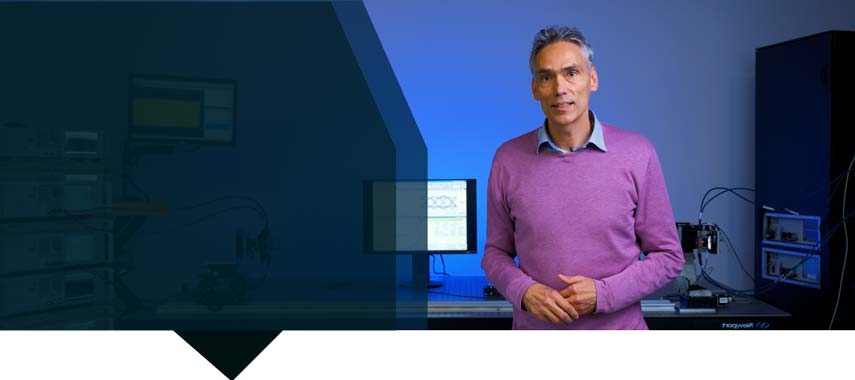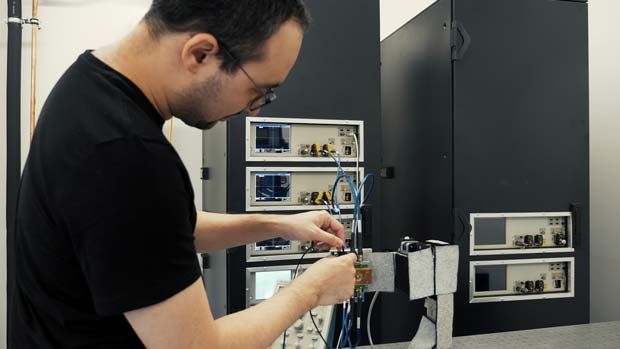Contact us
Call us at
Available 6:00 AM – 5:00 PM (PST) Business Days
Download
Download Manuals, Datasheets, Software and more:
Feedback
Wuppertal University Case Study
Developing Advanced 6G Technology

Each succeeding generation of communications technology has brought forth transformations across many fields, including the life sciences. Yet the transition to 6G promises an even greater impact: providing one of the keys to making life on earth more sustainable.
Professor Dr. Ullrich Pfeiffer said: “As a scientist, researcher, and Chair of High Frequency Systems in Communication Technology at the University of Wuppertal, I’m naturally curious and driven by finding the unknown. 6G can make all of our lives different in terms of internet, sensor and overall connectivity services. As an example, the 6G network will have sufficient bandwidth to offer people a 360-degree 16K videos or holographic displays and transform the capacities of industries to exchange complex, time sensitive information. Due to increased data bandwidth and lower latency, Internet-of-Things devices will be able to exchange huge amounts of data very quickly, while consumers will be able to take part in real time games with highly advanced augmented reality graphics and download large video files, such as feature films, almost instantly.”

The commercial deployment of 6G technology also supports the United Nations Sustainable Development Goals (SDGs), both scheduled for 2030. The core of the SDGs is to make the planet more livable by 2030 by eradicating poverty, enabling gender equality, combating climate change and developing smart cities and 6G can be a key tool in achieving these ambitions.
Developing the technologies to make 6G a reality is the goal of a project run by Wuppertal University. Among the aims of the project is the development of components that allow the higher data throughputs that 6G will demand, while also cutting the latency of networks to allow real-time, high-density data exchange.
Other applications relying on these abilities will also include autonomous driving and remote surgery with haptic feedback. Highly advanced 6G applications include remote rescue and medical applications, which require the highest resolution 360° video transmission.
As well as leveraging faster digital to analogue and analogue to digital converters, the project will also look at increasing data rates using multiple channels, as well as balancing speed against energy use. The project will explore the limits to the speed of transistors, the best packaging technology for these high-speed components and how new designs compare to real world performance.
The Customer Challenge
As part of the research program, run by Prof. Dr. Ullrich Pfeiffer, the project aims to develop higher performing THz transceivers, supporting increased data rates using multiple channels and balance speed against energy use.
The results and findings of the research will help the IEEE draw up new standards that will define the performance and protocols expected of the future 6G networks.
Such cutting-edge research to develop new underlying technology demands test and measurement equipment good enough to take measurements on components that may be operating at the theoretical limits of performance.
Requirements of the project’s test and measurement equipment included instrumentation that could demonstrate the best vertical resolution, the best residual Error Vector Magnitude (EVM), a large memory and the ability to synchronize multiple instruments.
The Solution
Following a careful consideration of available vendors, Prof. Dr. Pfeiffer and his team chose Tektronix. With the help of the company, the team decided on a suite of oscilloscopes, wave form generators and signal analysis software that would meet their needs.
The scope of supply encompassed six DPO77001SX 70GHz Oscilloscopes, six AWG70001B 50 GSa/s Arbitrary Waveform Generators, three AWG Synch Hubs, three SignalVuPC Vector Signal Analysis Software, three SourceXpress Waveform Generation Software and two water cooled 19” Racks supplied by system integrator ATV (Automatisierungstechnik Voigt GmbH). These racks reduce acoustic noise and improve thermal stability.
Features of the Tektronix test instruments include synchronization between devices and the ability to add new capabilities through their modular construction. This modularity allows the team to increase the number of channels that the instruments can read simultaneously. Other important features include Internet connectivity, self-calibration, and an open hardware and software architecture to test innovative algorithms. These features will cut the time needed to set up measurements and provide high accuracy and repeatability.
Professor Dr. Pfeiffer said: “The test and measurement equipment needed to offer the right tools to develop underlying, fundamental technology. Our experiments will operate at the limits of the technology and available test instruments, and we therefore needed equipment that was on the edge of technological capabilities.”

An important aspect for the Wuppertal team was finding a vendor of high-performance test technology that understood the challenges the team faced in developing new, high-performance components. This meant it was vital to have access to a vendor’s technical experts.
Tektronix has local engineers in Germany that can work with the researchers onsite, as well as software development teams that can work on the project requirements from India and the US. Professor Pfeiffer is excited about the partnership with Tektronix: “We expect the cooperation with Tektronix to produce many breakthrough results in the near future.”
– Prof. Dr. Ullrich Pfeiffer | Professor at Wuppertal UniversityWe were pleased to have found Tektronix, as access to their technical experts made our team feel safe and supported. Particularly the possibility to scale up the system by synchronizing multiple instruments is crucial for research on THz MIMO communication. By working with the global team of Tektronix engineers in this cooperative way, we feel we can really unlock the ‘magic’ in Tektronix solutions.
Products, Software, and Services Provided
| Product | Description |
|---|---|
 |
DPO77001SX 70GHz Oscilloscopes |
 |
AWG70001B 50 GSa/s Arbitrary Waveform Generators |
 |
AWG Synch Hubs |
 |
Vector Signal Analysis Software |
 |
SourceXpress Waveform Generation Software |

